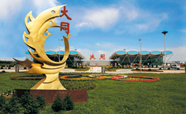Mine bosses switch career paths amid industry reform
However, switching industries has not been easy for the mine bosses.
"At the beginning of stepping into the apricot processing industry, my company was operating in the red," Ren said. "Lacking relevant technology, reliable talents, and the latest information, my new business stumbled along with an annual deficit of more than 10 million yuan ($1.5 million)."
However, with the help of the experts from Beijing, his business is now prospering and the renowned natural drinks company, Lulu Group Co., Ltd, has invested in it.
"During the hardest period, the head of our county paid a visit in person to the Ministry of Agriculture in Beijing to ask for help," Ren recalled.
Having brought in high-class talents and technologies, the Datong city government has also adopted some preferential measures like providing loans and financial subsidies to these newly-founded enterprises, and helped promote sales of their products.
"Though the benefits are not immediate, I am still full of confidence," Wu Wenguan, also a former mine boss, said.
Wu has run a mushroom factory after selling his private coal mine.
"It was very risky working in the coal mining business. I used to worry about accidents every day," Wu sighed. But his new business is very different as it's not only profitable but also sustainable.
Local farmers have also benefited from the newly-developed agricultural companies.
Zhu Chunmin, an employee from Ren Fu's company, said that his annual income surged to 80,000 yuan last year, compared with 2,000 yuan five years ago when the income generated was barely enough to live off.
Due to mine bosses getting out of mining and into the agriculture and food processing sectors, 14 leading enterprises in Nanjiao district of Datong City have created 13,000 jobs and grown farmers' incomes by about 460 million yuan in total.
"However, there are still some challenges those former mine bosses have to face," Zhang Baohua, a researcher with the Shanxi provincial Academy of Social Sciences, said. "How to attract talented people to work in remote places is the key problem."
"Whether more mine bosses are willing to shift to the agricultural sector is still hard to say," Zhang added.
Copyright 1995 - 2010 . All rights reserved. The content (including but not limited to text, photo, multimedia information, etc) published in this site belongs to China Daily Information Co (CDIC). Without written authorization from CDIC, such content shall not be republished or used in any form. Note: Browsers with 1024*768 or higher resolution are suggested for this site.

